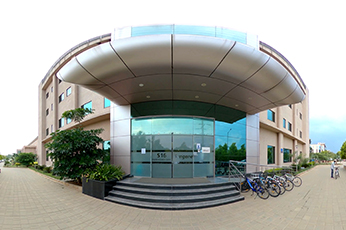A high-risk program like drug discovery necessitates risk mitigation built into the process. A major cause of drug candidate failure in clinical trials is not the drug itself but insufficient time/resources/experience in identifying the ‘right’ target. However, decisions on targets must be based on a holistic assessment that includes all available information.
Syngene’s Target Identification and Validation exercise combine data, informatics, and knowledge about biological target assays to reduce the risk of failure manifold. Holistic assessments of targets at the start of a program enable informed decisions about which drug targets to take forward and help reduce late-stage attrition.
Our services include integrative data analysis, target dossiers, knowledge bases, systems modeling, various target class assays, and phenotypic screens. These services help you identify key pathways and networks to understand the biological rationale, disease-driving mechanism of action, target druggability, and competitor landscape.
Target Identification and Validation
Integrative Data Analysis | Target Assessment | System Modeling and QSP | Assay Biology | Functional Genomics | Proteomics |
|---|---|---|---|---|---|
|
|
|
|
|
|
Target Identification & Characterization services: Overview
We provide expertise on the complete target identification and validation process using a combination of computational and in vitro approaches, which are applied at various stages.
Simplified depiction of Target Identification and Validation workflow
Computational & Data Sciences services
Multiomics data analysis, network biology, systems modeling, and literature evidence are combined to identify the role of the target and assess its therapeutic potential in the disease of interest. Potential targets for a therapeutic program can then be prioritized based on multiparameter scoring that follows the SWOT analysis approach. In this approach, you first look at the specifics of the target itself (strengths and weaknesses) and then place those into the broader context of competing targets and the overall clinical landscape (opportunities and threats).
Integrative data analysis
A deep understanding of human health and diseases is a prerequisite to discovering better targets. Analysis of multi-omics data and clinical information reveals a lot of information about important genes and pathways involved in disease progression. An integrative approach using multi-omics data is a powerful strategy to understand complex biology systematically and holistically. In the past, the importance of integrating proteomics data with genomic and transcriptomic data has led to the prioritization of driver genes in colorectal cancers.
We have expertise in deriving conclusions from omics studies such as genomics, transcriptomics, proteomics and metagenomics, and immunomics. This is in addition to microarrays and high-throughput biological assays. For further details, please click here
Knowledge graphs (KGs)
We create knowledge graphs around the therapeutic area of interest, which helps to establish relationships, identify key pathways and networks, and understand the mechanism of action (MOA) to elucidate the role of a target in disease. The knowledge graph combines multi-omic data with clinical evidence and published information over the protein interaction subnetwork. It generates mechanistic hypotheses, identifies key markers, and helps build disease models. The disease networks can also be extended to the quantitative systems pharmacology (QSP) models.
Systems modeling
Systems modeling and QSP is a mechanistic modeling approach used to assess therapeutic intervention for a disease of interest by linking molecular and cellular mechanisms of the disease and drug to system-wide dynamics, bridging biomarkers, and clinical endpoints relevant to the disease. Mechanistic, quantitative time-dose response models help identify mechanisms of pathophysiology or disease or demonstrate proof‐of‐concept evidence of the validity and importance of new discoveries or treatments.
Effect of a protease inhibitor on bilirubin levels in normal and Gilbert’s syndrome patients
Our systems modeling group develops bespoke mechanistic, quantitative biological models. For further details, please click here
Target dossiers
A target dossier comprises a target’s structural, functional, pharmacogenomic, and safety aspects. It includes function, tissue expression profiles, druggability, competitive landscape, biological pathways/network, physiological mechanisms, paralogs/orthologs, structure, mutations, genomic rearrangements, and phenotypic data (Figure 3).
Automated information retrieval technologies are combined with scientific expertise to glean insights for enabling executive decisions and program design.
Target dossier– Biology and Bioinformatics-based comprehensive profiling to characterize a drug target
For further details on various types of target dossiers and knowledge graphs, please click here
Assay Biology services
Syngene’s assay biology and screening team bring together world-class scientists, state-of-the-art infrastructure, and streamlined processes. Services range from sample submission to data transfer. This includes strong quality management to deliver a wide range of assays and screens for target-based discovery programs or an approach around a phenotypic outcome.
To know more about the assays offered, please click here
Target Class assays
Our high throughput assays cater to different target classes (kinases, non-kinases, GPCRs nuclear receptors, ion channels, and other mechanisms, including protein-protein interactions and transcription factors. The detection methods include fluorescence, fluorescence polarization (FP), TR-FRET (HTRF®, LanthaScreen®, LANCE®, DELFIA®, AlphaScreen®), luminescence, and radiometric (filter-binding and SPA). We can also design custom-made assays for specific requirements.
Phenotypic screens
Syngene has expertise in various functional endpoint assays and screens of physiological relevance, such as metabolic endpoint assays and cellular endpoint assays. Our expertise is across indications such as Oncology/ immuno-oncology, cancer metabolism, metabolic disorders, NASH, fibrosis, autoimmune disorders, CNS, dermatology, and various orphan diseases. The assays range from medium to high throughput and use multiple platforms like High content imaging, live cell imaging, QPCR, and high throughput Westerns.
Functional genomics
An important approach to identifying therapeutic targets in the early discovery stage is to study the genes and identify the changes in their expression. This can provide valuable information about the pathophysiology of the disease. Syngene has a strong genomics team that can provide different gene expression services. These include:
- Genome-wide screens using DNA microarrays
- CRISPR genome editing, siRNA, and shRNA panels for target discovery
- Metagenomic analysis
- NGS
For further details on various types of genomics services, please click here
Proteomics services
Proteomics plays a significant role in identifying disease biomarkers and alterations in the cellular protein targets. Syngene uses state-of-the-art LC-MS, ESI-MS, MALDI-TOF platforms, and technologies such as 2D-Electrophoresis, Crystallography, and various types of chromatography to deliver services in this space. Further, our scientists have significant expertise in various proteomics approaches for target identification, ensuring the selection of the right approach, whether bottoms-up, top-down or bespoke method. We also have protein capabilities across different expression systems to ensure that the proteins are expressed abundantly, thereby eliminating background noise that affects various downstream assays of target deconvolution. To learn more about our proteomics services, click here
Target Validation
Syngene offers the following services for Target Validation.
Genetic manipulation of target genes (in vitro)
- Knocking out the gene using tools such as CRISPR-Cas9 & TALEN
- Knocking down the gene using tools such as siRNA and shRNA in cell lines and primary cells
- Knocking in the gene (viral transfection of mutant gene) using tools such as CRISPR-Cas9 in cell lines and primary cells
Animal models (in vivo)
We offer knock-in/knock-out rat or other animal disease models for target engagement across oncology, metabolic disorders, cardiovascular, fibrosis, pain, inflammation, autoimmune diseases, and CNS.
Next Generation Sequencing services
Our next-generation sequencing (NGS) technology enables the profiling of DNA and RNA at very high throughputs and high resolution to address various biological questions. The technology can be used at different stages of target discovery, from identification to validation.
Here is a point of view on maximizing clinical and commercial success by early assessment of targets. To read the point of view click here.










